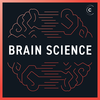We’re talking with Evan Conrad — for most of Evan’s life he has suffered from severe panic attacks, often twice per week. Eventually he stumbled upon a therapy method called Cognitive Behavioral Therapy, or CBT for short, and saw positive results. This led him to create Quirk, an open source iOS app which allows its users to practice one of the most common formats of CBT.
On the show we mentioned a new podcast we’re launching called Brain Science — it’s hosted by Adam Stacoviak and Mireille Reece, a Doctor of Clinical Psychology. Brain Science is a podcast for the curious that explores the inner-workings of the human brain to understand behavior change, habit formation, mental health, and the human condition. It’s Brain Science applied — not just how does the brain work, but how do we apply what we know about the brain to better our lives. Stay tuned after the show for a special preview of Brain Science.
If you haven’t yet, right now would be a great time to subscribe to Master at changelog.com/master. It’s one feed to rule them all, plus some extras that only hit the master feed.


